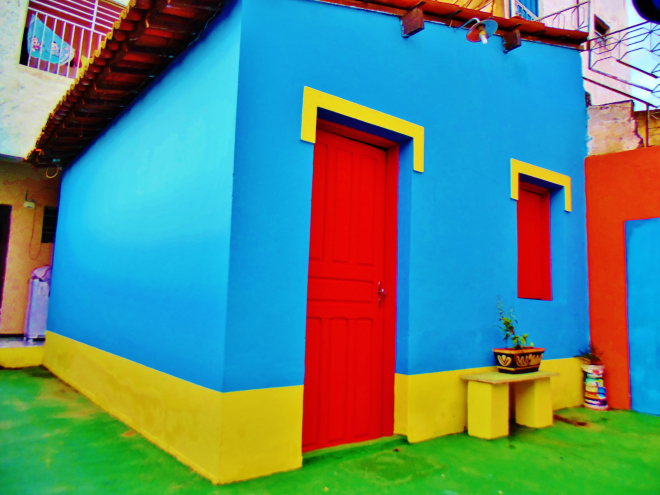
Following here, an article by Tourism Watch about tourism experience in Brazil :
“Come in, the house is yours!” Many Brazilians still use this old saying to make visitors feel at home. However, this hospitality is not found in Rio de Janeiro or São Paulo, but lives in the hearts and houses of people outside the hustle and bustle of the big cities. The much closer relationship between visitors and local hosts allows for more authentic experiences, but home stays have intrinsic problems. Protecting hosts’ privacy is the key to success.
Communities throughout Brazil have started to receive tourists and earn an additional income. There are many ways in which they participate in tourism. Some, especially indigenous communities and quilombolas (descendants of African slaves) opt for collectively managing guesthouse while others receive tourists in their own homes.

Separating home and guesthouse
Adriana Gomes Lima lives in Pará, in the North of Brazil. She is a leader in an island community of nut collectors, and in the MMIB (Movement of Women in Belem Islands). In addition to receiving tourists, she is preoccupied about how tourism affects the other women of the community who host tourists within their homes. “We have built guest houses that are separate from the main house. This allows tourists to interact with our family, while at the same time respecting our privacy.” She explained that the group of hosts have created some rules and regulations to guarantee safety, privacy and comfort for themselves and their guests. “We don’t offer or sell alcoholic beverages, for example. The guesthouses are a good solution. Everybody has their own morning habits, such as waking up or eating breakfast. So the guests have the freedom of their own schedule”.
These precautions help prevent problems. Adriana affirms that she has never had any issues with the tourists: “We offer experiences that are very different. Our guests are nature lovers, interested in trails, in talking to people. Sometimes we even stay up all night drinking coffee and talking in the kitchen.”
And she realizes that “receiving tourists has become so natural that we aren’t bothered if they come into the kitchen and join us for breakfast. We feel like they are family”. And she concludes that “Hosting visitors at my house has made many friends, Brazilian and foreigners. Many have returned not as tourists, but as friends. They still are paying customers but it’s a different relationship.”
Accepting intrusion?
Deuzani Gomes dos Santos lives in Minas Gerais in the Southeast of Brazil. She makes beautiful pots and dolls out of clay. She shares her ceramic knowledge and her poetry (despite of having only attended primary school she writes wonderful poems!) with tourists that visit her community. To receive visitors, she puts out the nicer bed linens, changes the kitchen mugs and makes sure that she creates the perfect atmosphere in which to welcome her guests.
She’s never had any serious problems with her guests, but some of them want things she can’t offer like Wifi, for example. “I get frustrated when my house doesn’t meet their expectations.” She admits that sometimes people can be a little intrusive, but she prefers not to confront visitors on this issue. “I never had the courage to say when something is not okay. Sometimes people don’t understand our point and can feel offended. Considering the short period the person is staying I don’t think it’s worth it.”
Nevertheless, she affirms she loves hosting, even though it means that she can’t produce as many handicrafts as she does when she is alone. But that doesn’t bother her. Deuzani likes to focus all her energy on her guests: “A family guesthouse is called family guesthouse because the guest becomes part of the family for the period that they stay.”
The right kind of tourists
Irenice Maria Macedo de Freitas lives in Ceará, Northeast of Brazil, in the Kariri hinterlands where a popular museum and trade school kept the culture alive and unique. She has been receiving tourists in her house since 1999. The guest suite is in the backyard, but she prepares the meals and the guests are allowed to freely roam around. They have never been intrusive, “Thank God the tourists we receive come because of the project and they are different from tourists that would come because of parties, for example”, she explains.
The project, Casa Grande Foundation, is a museum of local culture and a school for kids who want to become videographers, photographers, writers and musicians. The founder of this project, Alemberg Quindins, says: “Thinking Community Based Tourism as only income-generating tourism is too small. The backbone of Community Tourism has its basis in cultural diversity and human values.” Irenice agrees. “When people ask me what I think about receiving tourists, I tell them I receive the world in my home” she says proudly.
These three women have something in common: a special talent to host coupled with a curiosity about people and a pleasure in sharing their homes and way of life with others. Although they agree that money and privacy are important when transforming their homes into guesthouses, they all believe there’s something devotional about being a host. It’s more than opening your house to strangers, it’s about opening yourself.
Mariana Madureira is a co-founder of Raízes Sustainable Development, a social business for local development and women empowerment, and director of Projeto Bagagem, an NGO developing and promoting community-based tourism.
This text was originally published on Tourism Watch blog – “Protecting Privacy”. Check out our portuguese version “Garantindo a privacidade: experiências com o turismo comunitário no Brasil”.
You can also check the german version here.

